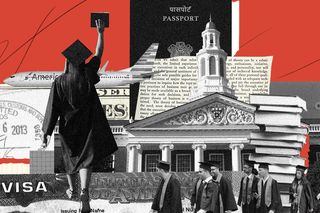
The Indian Study Abroad Dream Is Dashed. Will We Finally Redefine Success?
The value of a foreign degree is getting more unclear by the day.

Earlier this week, the U.S. Immigration and Customs Enforcement (ICE) announced – to widespread panic in India – new, stricter visa guidelines for foreign students already in the U.S. and those planning to begin studying there this fall. In the thick of the COVID-19 pandemic, millions of students may be asked to leave, refused visas and denied entry. Hot on the heels of the suspension of foreign workers’ H-1B visas, Indians – perhaps the staunchest believers in the American dream outside the States – saw another pathway to emigration evaporate.
For decades, we’ve believed that there is bountiful success and wealth to be gained by studying and living abroad. From the movies and books we consume, to the news we read, we’re a generation raised – like many before us – on an entire cultural oeuvre that tells us the grass is greener on the other side. We’re convinced that the fierce struggle to settle abroad, despite any number of growing obstacles, is worthwhile.
But what happens when these deep-seated notions of success finally go up in smoke? What happens when these places we’ve built up as utopias of opportunity show us their dysfunction and injustice? The ICE decision, among many other countries’ pro-nationalist policies that seek to limit foreign immigration, present a glaring crack in the system, throwing open massive gaps in our discourse on educational inequality. For the privileged among us, it has forced a long-overdue introspection on our entrenched value systems and the cycles of privilege we perpetuate back home.
Related on The Swaddle:
There Is No Such Thing as Achievement Through Pure Merit
Students who pursue a foreign education garner prestige and cultural capital, particularly when it also leads to higher paying jobs or a chance at immigration – and that allows society to continue to believe in the infallibility of this dream. A few decades ago, this conviction may have been merited. Thousands, if not millions, of Indians successfully (though not without hardship) moved abroad from the 1980s to the mid-2000s – and as a result, those aspirations have passed on to younger generations still in India. The pervasive cultural propaganda in India leads us to believe these dreams of prosperity – realized only on greener pastures – are within grasp. But the mounting climate of global xenophobia, economic changes, and population boom present a starkly different reality, and this dream is much more elusive than it’s ever been.
Cultural rhetoric has been used for years to justify the exorbitant fees charged by foreign universities (“because you need it to succeed”), and the widening income gap between those with the right degree and those without (“only those who invest heavily in their education can reap its benefits”). It also conveniently places the blame for India’s economic failures on Indian students “abandoning” the country to study abroad – but if and when they are forced to return post-graduation, they are labelled failures for not attaining the unattainable dream. In reality, much of this ideology is a smokescreen for foreign governments and companies to churn billions of dollars in revenue from gullible international students, without doing anything concrete to support immigrant aspirations.
Related on The Swaddle:
Education of the Future Is Not About Knowledge
While the value of a foreign degree is getting more unclear by the day, for families that can afford to send their kids abroad with few to no loans, the global exposure that foreign education provides is enough to keep it from losing its shine. Some of these students, who come from privileged sections of Indian society, have been jolted out of complacency by the injustices they experience abroad. What they don’t realize, however, is their own complicity in the same anti-immigrant, anti-undocumented-labour rhetoric back home in India. The same students that pass judgment on others’ broken English and complain about reservations in Indian colleges are the ones feeling suddenly disenfranchised by foreign countries denying them freedoms they feel entitled to.
Because the aspirations for a foreign life are so deeply embedded into the Indian psyche, we have largely avoided introspection on the flaws that make our own system so inequitable. The system of higher education in India is not only intensely competitive – every year, hundreds of thousands of students apply for just a few seats in the top-ranked colleges of the country – but also generally lacking in the quality, diversity and flexibility that make foreign universities so appealing. Many private schools succumb to corrupt political agendas and other forms of censorship, leaving many with no choice but to look abroad. Higher education here also provides little to no academic and social support to students from lower income or lower caste communities, beyond the frequently misused quota system – the very existence of which breeds resentment in students from upper echelons of society.
Inevitably, this system drives large sections of India’s middle class student population to seek out the significantly less competitive second and third tier universities abroad. But in pursuit of the status and success denied to them all their lives, many of these students go abroad only to find yet another system that crushes their dreams of upward mobility.
All of these problems are microcosms of a long history of inequality that is deepened by decades of cultural propaganda and hegemony. The task at hand is not only to urgently rethink what success means to us, but to recognize and dismantle the ways in which we elevate foreign cultures above our own – and challenge the fundamental shortcomings in India that lead us there in the first place.
Paroma Soni is a data journalist and videographer from Mumbai currently based in New York. Her work focuses on politics, human rights, gender, and culture. You can find her on social media at @paromasoni.
Related


Makers of Video Game ‘The Last of Us: II’ Receive Death Threats for Depicting Female Character As Muscular
